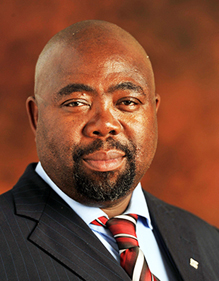|
Getting your Trinity Audio player ready...
|
 “To corrupt individuals, I want to leave you with the following thought: You can run, but you can’t hide. If you steal from the poor we are coming to get you.” These frank words, spoken by Public Works Minister Thulas Nxesi at a news conference this week, together with his no-nonsense approach to ridding his department of endemic rot, make Nxesi our hero of the week.
“To corrupt individuals, I want to leave you with the following thought: You can run, but you can’t hide. If you steal from the poor we are coming to get you.” These frank words, spoken by Public Works Minister Thulas Nxesi at a news conference this week, together with his no-nonsense approach to ridding his department of endemic rot, make Nxesi our hero of the week.
Appointed in October 2011 after the sacking of Gwen Mahlangu-Nkabinde, Nxesi didn’t inherit the easiest of jobs. The department has been dogged by a litany of fraud and corruption scandals recently, most notably the R1.6-billion police lease deal which led to a high-profile investigation last year by public protector Thuli Madonsela and the eventual firing of Bheki Cele as police commissioner and Mahlangu-Nkabinde as minister.
“Nxesi said the department was being pillaged by syndicates of corrupt officials and business interests, and they did not hesitate to destroy public records to cover their tracks,” it was reported by Business Day.
During the news conference the minister also elaborated on the progress made in probing about 10 high-profile cases of corruption in the department, including the police lease saga.
“He said the matter was still locked up in the high court where the department had applied for the lease deal to be declared invalid. The department was waiting for a court date for the matter to be heard,” Business Day reported.
Nxesi also announced that the contract to build a border post at Skilpadhek in North West, between South Africa and Botswana, had been cancelled because the site was unsuitable for construction.
“The contractor had been overpaid by R33-million and an official had received R1.5-million in kickbacks. Criminal fraud charges had been brought against the contractor and the official,” the minister said.
"Negative reports from the public protector and the auditor-general last year pointed to the depth and scope of corruption in the department — a situation made possible by lack of controls and persistent mismanagement.
"At the same time the quiet, but relentless, work of the Special Investigating Unit (SIU) — appointed through a presidential proclamation to investigate claims of corruption in the department in 2010 — has uncovered detailed evidence to allow us to proceed with disciplinary processes against certain officials within the department," he added.
Nxesi didn’t waste time getting down to business when he was appointed last year: just two weeks into the job he changed the way leases are approved in the department as he saw “the whole area of lease contract management as potentially liable to controversy".
“From now on only the acting director-general of the department, Mandla Mabuza, can approve lease deals,” he said at the time.
When presenting his first budget vote speech in parliament in May this year, Nxesi announced that the courts would be requested to order null and void the contentious leases and order the arrest of implicated officials. He add that years of poor management, under-capacity and a lack of proper financial controls had provided the ideal conditions for fraud and corruption to flourish.
In his media address this week Nxesi pointed out that process of dealing with syndicates of corrupt officials was a slow one due to various factors. These include the destroying of evidence in the form of public records, as well as system of laws which protect the rights of individuals facing disciplinary charges, including the right to request postponements of disciplinary hearings on medical grounds.
The minister emphasised that the onus was on the employer to ensure that disciplinary cases against employees who have contravened policies are dealt with as speedily as possible. This, he said was the reason why he found it necessary to bring in additional legal resources to facilitate the process, including the sourcing of additional assistance from the thorough and professional forensic investigations carried out by the SIU.
“I have said before that the turnaround strategy at public works rests on two pillars: First, zero tolerance to corruption and that this is a non-negotiable. In this regard SIU investigations are continuing and more individuals will be charged. The second pillar of the turnaround is the improvement of the business practices of the department,” he said.


